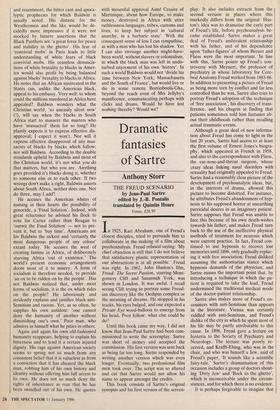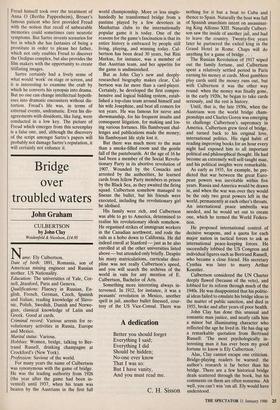Dramatic fantasies of Sartre
Anthony Storr
THE FREUD SCENARIO by Jean-Paul Sat/re edited by J.-B. Pontalis translated by Quintin Hoare Verso, f16.95 In 1925, Karl Abraham, one of Freud's closest disciples, tried to persuade him to collaborate in the making of a film about psychoanalysis. Freud refused saying: 'My chief objection is still that I do not believe that satisfactory plastic representation of our abstractions is at all possible.' Freud was right. In 1962, John Huston's film, Freud: The Secret Passion, starring Mont- gomery Clift and Susannah York, was shown in London. It was awful. I recall seeing Clift trying to portray some Freud- ian discovery like the Oedipus complex or the meaning of dreams. He stopped in his tracks, his eyes 'bulged, and one expected a Private Eye word-balloon to emerge from his head. Poor fellow: what else could he do?
Until this book came my way, I did not know that Jean-Paul Sartre had been com- missioned to write the screenplay. Sartre was short of money and accepted the commission. His first version was sent back as being far too long. Sartre responded by writing another version which was even longer. Eventually, two professional film men took over. The script was so altered and cut that Sartre would not allow his name to appear amongst the credits.
This book consists of Sartre's original synopsis and his first version of the screen- play. It also includes extracts from the second version in places where this markedly differs from the original. Hus- ton's idea was to dramatise the early part of Freud's life, before psychoanalysis be- came established. Sartre makes a great deal of Freud's ambivalent relationship with his father, and of his dependence upon lather-figures' of whom Breuer and Fliess were the most important. In line with this, Sartre points up Freud's con- troversy with Meynert, the professor of psychiatry in whose laboratory for Cere- bral Anatomy Freud worked from 1883-86. In addition to presenting a picture of Freud as being more torn by conflict and far less controlled than he was, Sartre also tries to portray Freud's adoption of the technique of 'free association', his discovery of trans- ference, and his chagrin at finding that patients sometimes told him fantasies ab- out their childhoods rather than recalling actual traumatic events.
Although a great deal of new informa- tion about Freud has come to light in the last 20 years, Sartre had access to at least the first volume of Ernest Jones's biogra- phy, which appeared in French in 1958, and also to the correspondence with Fliess, the ear-nose-and-throat surgeon, whose crazy ideas linking nasal disorders with sexuality had originally appealed to Freud. Sartre had a reasonably clear picture of the development of psychoanalytic ideas, but, in the interests of drama, allowed this picture to become distorted. For instance, he attributes Freud's abandonment of hyp- nosis to his supposed horror at unearthing parricidal desires in an imaginary patient. Sartre supposes that Freud was unable to face this because of his own death-wishes towards his father; and makes Freud turn back to the use of the ineffective physical methods of treatment for neurosis which were current practice. In fact, Freud con- tinued to use hypnosis to recover lost memories until 1896, only gradually replac- ing it with free association. Freud disliked assuming the authoritarian stance which hypnosis demands of the physician, and Sartre misses the important point that, by introducing a technique in which the pa- tient is required to take the lead, Freud undermined the traditional medical mode of the doctor-patient relationship.
Sartre also makes more of Freud's en- counters with anti-Semitism than appears in the literature. Vienna was certainly riddled with anti-Semitism, and Freud's dislike of the city in which he spent most of his life may be partly attributable to this cause. In 1896, Freud gave a lecture on hysteria to the Society of Psychiatry and Neurology. The lecture was poorly re- ceived, and Krafft-Ebing, who was in the chair, and who was himself a Jew, said of Freud's paper, 'It sounds like a scientific fairy-tale.' Sartre's dramatisation of this occasion includes a group of doctors shout- ing 'Dirty Jew' and 'Back to the ghetto', which is inconceivable under the circum- stances, and for which there is no evidence.
It is perhaps forgivable to imagine that Freud himself took over the treatment of Anna 0 (Bertha Pappenheim), Breuer's famous patient who first provided Freud with the notion that recall of unbearable memories could sometimes cure neurotic symptoms. But Sartre invents scenarios for her in which she has fantasies of being a prostitute in order to please her father, which not only enables Freud to discover the Oedipus complex, but also provides the film makers with the opportunity to create titillating images.
Sartre certainly had a lively sense of what would 'work' on stage or screen, and it is interesting to examine the craft by which he converts his synopsis into drama. But no one can change intellectual hypoth- eses into dramatic encounters without dis- tortion. Freud's life was, in terms of external events, undramatic. Even his dis- agreements with dissidents, like Jung, were conducted in a low key. The picture of Freud which emerges from this screenplay is a false one, and, although the discovery of the script amongst Sartre's papers will probably not damage Sartre's reputation, it will certainly not enhance it.



























































 Previous page
Previous page